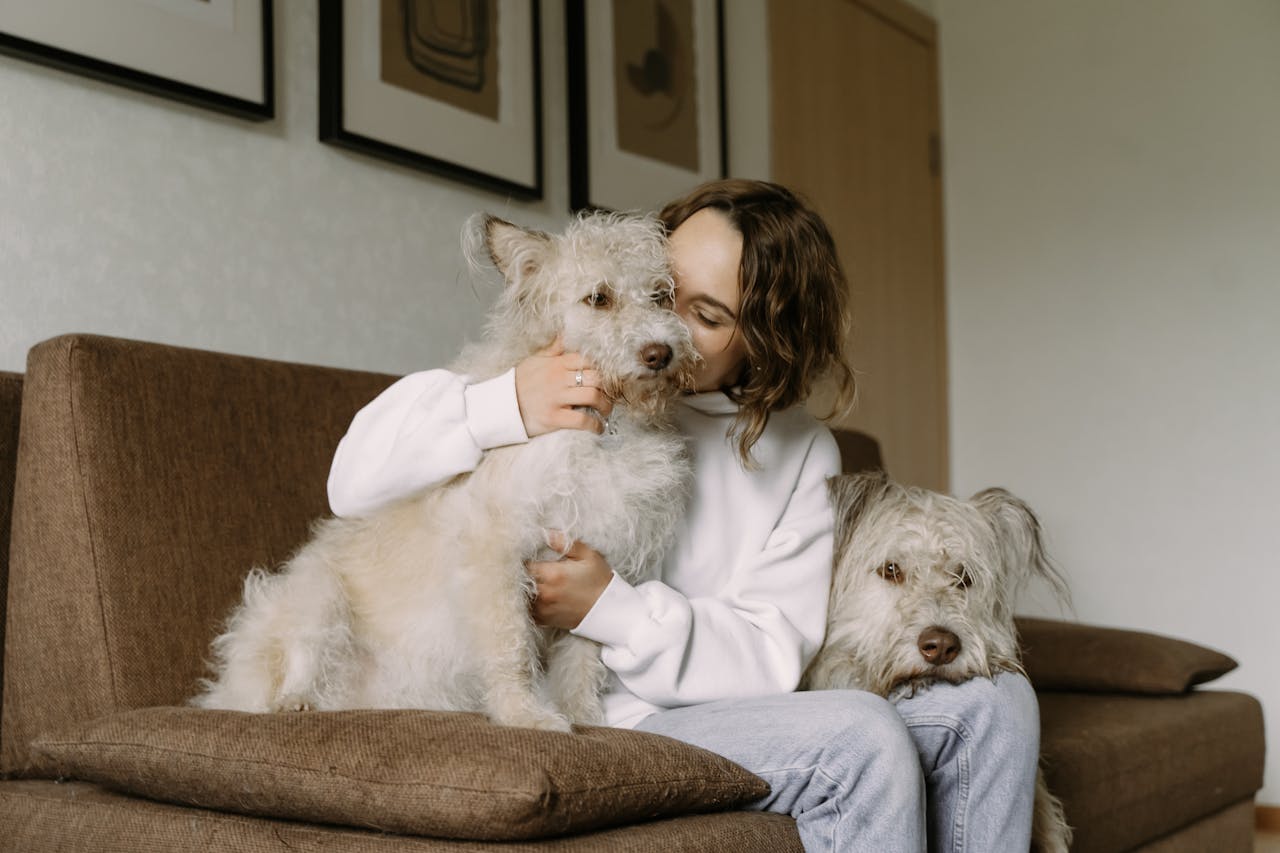Feeling overwhelmed? You might reach for your dog or cat before calling your spouse, and science says you’re not alone. A groundbreaking global survey of over 30,000 pet owners reveals surprising patterns about how people choose their stress-relief companions.
This research shows what pet lovers have long suspected: animals offer unique emotional support that humans sometimes struggle to match. Pet owners consistently report that their four-legged family members provide comfort in ways that feel different from human relationships.
Pets Over People: Silent Support Speaks Louder Than Words
Sometimes the best therapy requires no talking at all. More than half of pet owners (56%) value their animals’ ability to provide company without demanding conversation during stressful moments. Unlike well-meaning humans who often feel compelled to offer advice or solutions, pets simply exist alongside you in whatever emotional state you’re experiencing.
Animals don’t judge your bad days or expect you to explain your feelings. When anxiety strikes at 2 AM, your cat doesn’t question why you’re awake or suggest breathing exercises—they just curl up next to you. When work stress follows you home, your dog doesn’t analyze your coping mechanisms. They just rest their head on your lap.
Research shows that touch-based interactions with pets boost oxytocin levels in humans, creating the same bonding hormone released during positive human relationships. Yet pets offer this biochemical comfort without the social complexities that sometimes make human support feel burdensome during difficult times.
For those who do find vocalization helpful, 77% report that talking to their pets feels relaxing. Pets serve as perfect listeners—they never interrupt, offer unwanted opinions, or judge your concerns. You can express worries, fears, or frustrations without worrying about how your words affect another person’s emotional state.
Daily Wellness Reminders Come with Paws and Tails
Pets function as living wellness coaches, nudging owners toward healthier daily habits without being pushy about it. Nearly 80% of pet owners say their animals remind them to pause and take breaks from work, chores, or stressful tasks. For half of these owners, this gentle intervention happens every single day.
Your dog’s need for walks becomes your excuse to step outside and get fresh air. Your cat’s demand for attention forces you to stop doomscrolling and engage with something positive. These interruptions might seem inconvenient, but they serve as therapeutic breaks disguised as pet care responsibilities.

Animals operate on natural rhythms that human schedules often ignore. Dogs need regular walks regardless of your work deadlines. Cats require feeding at consistent times despite your Netflix marathon plans. These biological demands create a structure that supports mental health even when you’re not consciously seeking it.
Pet-induced breaks also combat digital overwhelm. Approximately 77% of owners report that their pets encourage screen breaks, with 50% experiencing these tech timeouts daily. When your dog nudges your laptop closed or your cat walks across your keyboard, they’re inadvertently protecting you from digital burnout.
Outdoor Time Becomes Automatic Medicine
Fresh air and sunlight have been shown to provide documented mental health benefits, but many people struggle to prioritize outdoor time. Pet ownership makes this choice automatic rather than optional. Approximately 73% of pet owners report that their animals encourage them to engage in outdoor activities, transforming wellness habits into enjoyable shared experiences.
Dog walks become moving meditation sessions. Cat owners who create outdoor enclosures find themselves spending more time in gardens and patios. Even indoor pets inspire their owners to open windows and seek natural light for the sake of their companions’ well-being.
Outdoor pet activities also encourage mindfulness. Watching your dog explore interesting scents or observing your cat track bird movements pulls your attention into the present moment. These experiences provide natural breaks from rumination and worry cycles that fuel anxiety and depression.
Regular outdoor exposure helps regulate circadian rhythms, improving sleep quality and mood stability. Pets create accountability for maintaining these beneficial routines even when motivation wavers during difficult periods.
Stress Interruption Happens Naturally
Pets excel at breaking negative thought patterns without trying. When your mind spirals into worry or catastrophic thinking, your pet’s needs or behaviors naturally redirect your attention. Approximately 73% of owners report that their pets help reduce overthinking and worry, leading to calmer mental states.
Animals live entirely in the present moment, and their presence invites you to join them there. Your anxious thoughts about tomorrow’s presentation fade when your dog wants to play fetch right now. Worries about past mistakes diminish when your cat demands immediate attention for head scratches.
Pet care activities require focus that crowds out rumination. Filling water bowls, brushing fur, or cleaning litter boxes might seem mundane, but these tasks ground you in concrete, manageable actions during times when everything else feels overwhelming.
The responsibility of pet care also provides a sense of purpose during episodes of depression or anxiety. Even when self-care feels impossible, caring for your pet gives you a reason to get out of bed, maintain routines, and engage with the world beyond your internal struggles.

Touch Therapy Doesn’t Require Appointments
Physical affection with pets offers immediate stress relief, eliminating the need for scheduling or social complexity. Petting a dog or cat triggers the relaxation response, which lowers blood pressure and reduces cortisol levels. Unlike human touch, which can feel complicated during vulnerable moments, pet affection feels unconditionally safe.
Research demonstrates that even brief interactions with therapy animals can improve focus and attention spans. These benefits persist even after the animal leaves, suggesting that pet contact creates lasting positive changes in brain chemistry and emotional regulation.
Different pets offer various types of therapeutic touch. Dogs provide warm, steady pressure during hugs. Cats offer gentle vibration through purring. Even watching fish swim can lower stress hormones through the visual soothing effects.
Regular physical contact with pets may strengthen immune function and reduce inflammation markers associated with chronic stress. This biological response explains why pet owners often report an improvement in overall health and a faster recovery from illnesses or surgeries.
My Personal RX: Holistic Tips to Lower Stress Through the Power of Connection
Stress isn’t always about what’s happening to us. Often, it’s about who we’re experiencing it with—or without. The people (and animals) we surround ourselves with can either fuel our tension or ease it. In a world full of noise and pressure, choosing your inner circle wisely may be one of the most powerful acts of self-care. And when you combine meaningful relationships with intentional nourishment, the body and mind respond in kind.
- Audit your social energy: Not everyone deserves a front-row seat in your life. Take stock of relationships that leave you drained versus those that leave you grounded.
- Make space for companionship: Whether it’s a loyal pet or a trusted friend, shared presence has been shown to lower cortisol and ease nervous system tension.
- Feed your microbiome, feed your mood: Chronic stress disrupts gut bacteria, which in turn disrupts mood balance. MindBiotic helps restore this crucial link in your gut-brain axis to build resilience from within.
- Cook and eat together when possible: Meals shared with others are scientifically linked to better digestion, reduced stress, and even healthier food choices. Let the Mindful Meals cookbook guide you in crafting gut-nourishing dishes made to be enjoyed in good company.
- Recognize emotional triggers: The people closest to us often reflect our deepest emotional patterns. Pay attention, not to react, but to heal.
- Prioritize deep, not constant, connection: You don’t need dozens of daily interactions. A few moments of true connection go a long way in calming the nervous system.
- Be selective with digital interaction: Digital connection can’t replace real-life relationships. Set boundaries with social media that protect your peace.
- Build your anti-stress plate: Gut-healthy meals rich in magnesium, omega-3s, and fiber not only soothe the digestive tract—they calm the mind. Refer to Mindful Meals for easy, science-backed recipes.
- Check in with yourself after social time: Do you feel nourished or depleted? Let your body be your guide in choosing who and what to spend time with.
- Balance alone time with connected time: Solitude is important, but isolation isn’t healing. Strive for a rhythm that allows you to recharge and relate.
Source:
Mars & Calm. (2025, May 13). Paws over partners: people prefer to spend time with pets when stressed. Mars. https://www.mars.com/news-and-stories/press-releases-statements/people-prefer-spend-time-with-pets-when-stressed
Featured image: Pexels











 Subscribe to Ask Dr. Nandi YouTube Channel
Subscribe to Ask Dr. Nandi YouTube Channel









